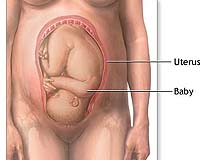Study: Lactate concentration in vaginal fluid can predict preterm baby risk
 Recent research has shown that new test that measures the lactate concentration in vaginal fluid could improve the prediction whether a woman is likely to give birth if her waters break early in pregnancy. The study showed that high concentration of lactate in vaginal fluid is strongly associated with onset of labour within 48 hours.
Recent research has shown that new test that measures the lactate concentration in vaginal fluid could improve the prediction whether a woman is likely to give birth if her waters break early in pregnancy. The study showed that high concentration of lactate in vaginal fluid is strongly associated with onset of labour within 48 hours.
Researchers at the Karolinska Institute Soder hospital in Stockholm assessed reliability of the "Lac-test" in 86 women with singleton pregnancies of 20 to 36 weeks gestation.
Researchers found that among 23 women with high lactate concentrations, 87% had spontaneous onset of labour within 48 hours. The study also showed that in 58 women with low lactate concentrations - in effect a negative Lac-test - only 5% went into labour within 48 hours.
The study concluded that the median time between examination and onset of labour was 13.6 hours for those with a high lactate concentration and 48 days for those with a low lactate value.
Lead author Dr Eva Wiberg-Itzel, from the department of clinical science and education at the Karolinska Institute, said: "Thanks to this new method, a reliable diagnosis of PPROM could be made. We believe that the 'Lac-test' adds important information in clinical practice."